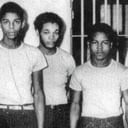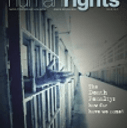By HENRY WEINSTEIN
Los Angeles Times
Thursday, November 01, 2001
As warplanes bomb Afghanistan and commandos scour that country’s forbidding countryside, U.S. military strategists are trying to figure out where Osama bin Laden and his associates are hiding and how to inflict the most punishment on them.
Experts of an entirely different sort are also thinking hard about bin Laden. They are puzzling out how and where the alleged terrorist leader should be put on trial if U.S. officials ever get hold of him.
The image of bin Laden in an American courtroom, huddling with defense lawyers, might seem far-fetched when U.S. missiles are raining down on his presumed hideouts and President Bush has declared him “wanted dead or alive.”
Yet a trial could well be the result of the U.S. pursuit of bin Laden, according to experts in international law and veteran war-crime prosecutors. Some even argue that this should be Bush’s aim: to prove bin Laden guilty rather than simply have him killed.
The notion of trying the Saudi fugitive has become a lively topic of debate among legal scholars.
Proponents say it would be a marvelous way to showcase American principles and demonstrate that the U.S. justice system can function fairly under adverse circumstances. They also say a trial could prove to the international community that the Sept. 11 hijackings in the United States were planned and perpetrated by bin Laden’s al-Qaida terrorist network.
“You want to show the world our values, our system — that under the most severe strain, we are true to those values,” said Lawrence Barcella, a Washington, D.C., attorney who prosecuted high-profile terrorism cases during 16 years at the Justice Department.
A public trial might also cut bin Laden down to size, Barcella said.
“The terrorist you see on a film clip on CNN holding an AK-47 does not seem quite so terrifying sitting in the dock of a courtroom, with two huge marshals standing next to him,” he said.
Other scholars shudder at the idea of bringing bin Laden into a U.S. courtroom. They say it would be extraordinarily difficult to provide adequate security for jurors, the judge and other participants, and all but impossible to select an unbiased jury. Skeptics also fret that a trial would give bin Laden a platform to propagate his ideas and recruit followers, and that his supporters abroad might take hostages in an effort to secure his release.
“Our system was not designed to try someone who declares war on the U.S. and is willing to use all imaginable means — or what to me were unimaginable means before September 11 — to carry out that war,” said Beth Wilkinson, a former Justice Department lawyer who helped prosecute Timothy McVeigh for the 1995 bombing of the Oklahoma City federal building, an act that killed 168 people and injured hundreds.
“I hate to say it, but this case may be too big for the criminal-justice system,” said Juliette Kayyem, a former Justice Department lawyer who runs the domestic-security program at Harvard University’s Kennedy School of Government.
Experts on the other side of the debate argue that the potential risks and complexities of a trial would not justify denying bin Laden due process of law.
“It would send a terrible message if we said we’re not going to hold a trial because of security threats,” said Erwin Chemerinsky, a professor of constitutional law at the University of Southern California. “Where would it stop if we did this?”
The Bush administration has not spelled out what it would do with a captured bin Laden. But under U.S. and international law, officials would be obliged to grant him a trial.
A trial on charges stemming from the Sept. 11 hijackings could be held in any of the cities where the four flights originated, in the places where they crashed, or in locales where the hijackers took pilot training or opened bank accounts.
Foreign governments also could put the al-Qaida leader on trial.
Under an international hijacking convention adopted 30 years ago, any of the 80 nations whose citizens died in the attacks could try bin Laden. The convention binds the 175 signatory countries, which include the United States and Afghanistan, to prosecute hijackers and their accomplices or extradite them to countries willing to do so.
Chapter 7 of the United Nations charter provides another legal path. It gives the U.N. Security Council broad authority to create special courts when there are threats to peace and security. In recent years, the world body has created such courts to hear allegations of war crimes in the former Yugoslavia and in Rwanda.
The hijacking convention “is directly on point and provides a comprehensive framework for dealing with … the tragic events of September 11,” said Francis Boyle, a University of Illinois law professor who represented the Libyan government on matters related to the 1988 bombing of a Pan Am flight over Lockerbie, Scotland.
Boyle said the United States should present whatever evidence it has against bin Laden to the Afghan government and request his extradition.
Bush, while describing bin Laden as “the evil one” who “we know (is) guilty,” has declined to make his case publicly. Instead, the administration has provided evidence primarily in secret to allies, including Britain and Pakistan. Pakistani President Pervez Musharraf has said there was enough evidence to indict bin Laden. British Prime Minister Tony Blair issued a 21-page paper laying out the case as of Oct. 4. Much of the evidence is circumstantial.
Blair said that at least three of the hijackers were known associates of bin Laden “with a track record in his camps and organization,” and that bin Laden “told associates that he had a major operation against America under preparation.”
Blair added: “A range of people were warned to return to Afghanistan because of action on or around 11 September, and most importantly, one of bin Laden’s closest lieutenants has said clearly that he helped with the planning of the … attacks and has admitted the involvement of the al-Qaida organization.”
Bin Laden has spoken once publicly since the attacks, in a videotaped statement released after the start of the U.S. bombing. He praised the hijackers and said “America will not live in peace” unless the United States withdraws its troops from Saudi Arabia and ceases its support for Israel.
What U.S. officials and Blair have outlined publicly amounts to a massive conspiracy case against bin Laden, said Laurie Levenson, a professor at Loyola Law School in Los Angeles and a former federal prosecutor.
Conspiracy statutes hold plotters liable for all acts by all members of a conspiracy, even if they do not discuss each act in advance. Though firmly embedded in U.S. jurisprudence, conspiracy law is viewed with skepticism in international courts, Levenson said.
That is not the only argument for putting bin Laden on trial in the United States, said Robert Goldman, a professor of international law at American University in Washington, D.C.
“The U.S. is the center of gravity of this case,” Goldman said. “The crimes occurred on U.S. soil. There were many violations of U.S. law. The U.S. had the most victims.”
However, other knowledgeable attorneys said there were philosophical and practical reasons for using an international tribunal.
“In light of the international coalition that Bush has called for, it would be particularly appropriate if the international community took action,” said Richard Goldstone, a justice on South Africa’s constitutional court, who set up the prosecutor’s office for the International Criminal Tribunal for the Former Yugoslavia.
Goldstone said that, although there might be reluctance to extradite bin Laden to the United States for fear that he could not get a fair trial here, no country could legally refuse to extradite him to a court established by the U.N. Security Council.
If bin Laden is tried in the United States, “we risk winning the battle but losing the war,” said Ann-Marie Slaughter, a professor of international law at Harvard University. “By making this an American event, we would shift attention away from the global nature of the attack. We lose enormous legitimacy, certainly in Muslim countries.”
If bin Laden were tried in the United States, he could face the death penalty upon conviction. By contrast, all the major U.S. allies in Europe have abolished the death penalty, and the international tribunals adjudicating war crimes in the Balkans and Rwanda cannot impose capital punishment.



